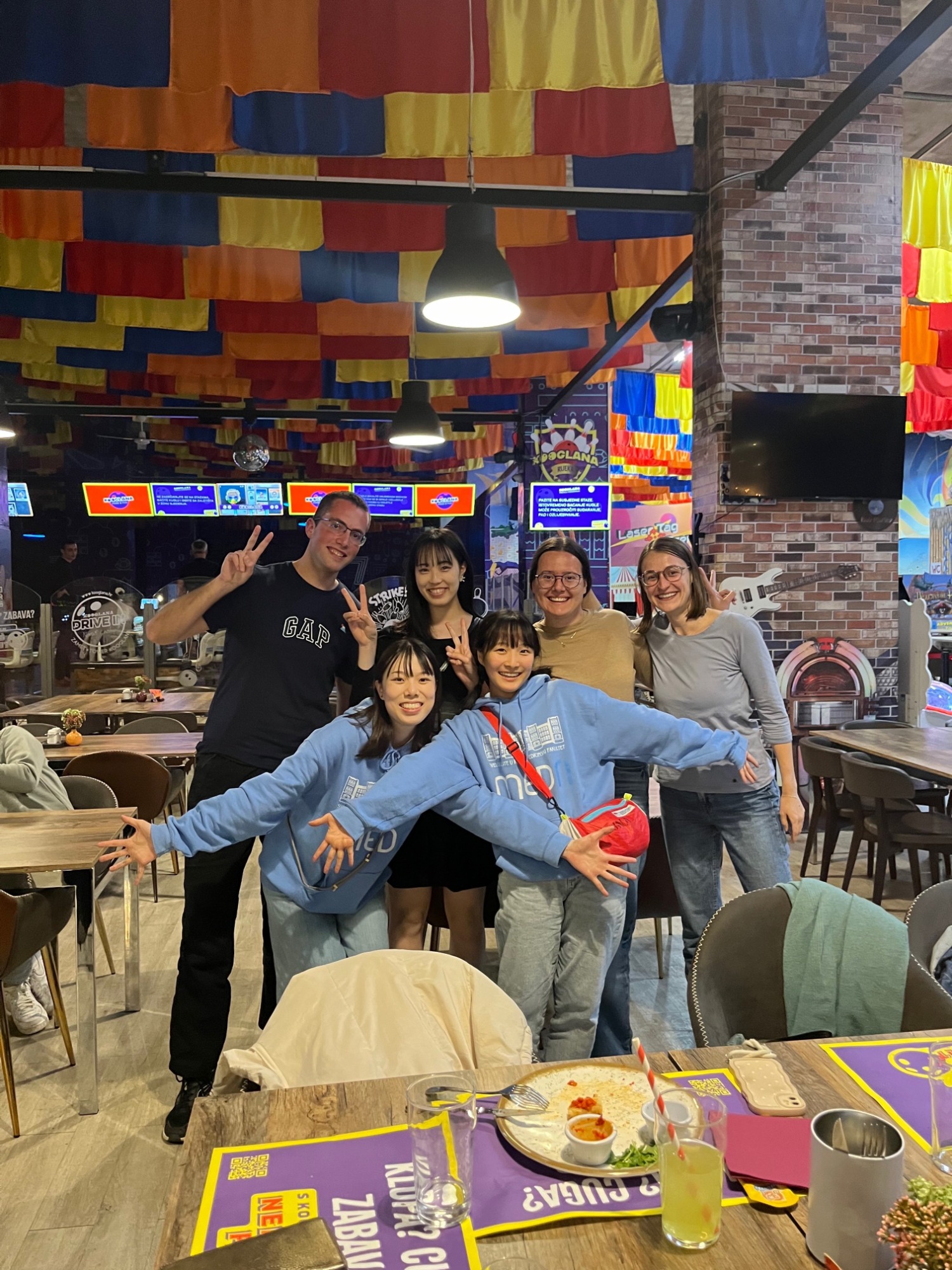International and Domestic exchange
Yoshino Hiromoto (5th grade)
After completing my internship at the University of Rijeka
I did my hospital internship at the University of Rijeka in Croatia for four weeks from September 20, 2024. I would like to express my sincere gratitude to everyone involved, including the professors at Hyogo Medical University who supported me in participating in the internship, the local professors who supervised me, the staff at the Center for International Education, and the three Croatian international students who helped each other in a foreign land.
On the first day of my study abroad, I arrived in Zagreb, the capital of Croatia, with two friends after a 20-hour flight from Kansai International Airport via Doha. On the way from Zagreb to Rijeka, where I was going for my internship, everything I saw was beautiful, and I was excited to see the mysterious Croatian cityscape where you can feel nature right next to you even though you are driving on the highway. After arriving at the dormitory that day, I was shown around the city by the person in charge of studying abroad in Rijeka. I enjoyed the scenery and food of Croatia, which I was seeing for the first time, and I was excited about how I would spend the next month.
I spent the first two weeks in the Department of Cardiology, then one week each in the Department of Respiratory Medicine and the Department of Renal Dialysis. The hospital where I did my internship was about 30 minutes by bus from the dormitory. On the first day of my internship, I was very nervous, but the doctors were cheerful and friendly. During the morning conference, I had the opportunity to greet about 20 doctors, and they asked me many questions about Japan, which gradually eased my tension.
During my cardiology training, I basically followed my supervisor around, and when he was busy, I would look around the ward on my own or go to see cardiac catheterization. The first thing that surprised me was that on the first day of training, my supervisor told me, "You can decide your own training time. If you get hungry, you can go home, and if you want to stay here all night, you can stay until midnight." There were no other students, so I don't know if the trainees in Croatia had the same schedule, but I felt that it was a very free environment. He told me many places to visit, saying, "Since you came all the way from Japan, I want you to enjoy sightseeing as much as you can." I went to the hospital at 8am, broke up around 11am-12pm, had lunch, and went back to the dormitory every day. During the ward rounds, when the supervisors palpated and auscultated the patients, I also continued to examine them together. Even when I was watching next to them not knowing whether I could touch the patients, they said, "Don't be shy, just try it." Since then, I have been able to interact with patients proactively. When I first put the stethoscope to a patient, I was so nervous and anxious about whether I was doing it correctly that I couldn't tell if I was hearing the patient's heartbeat or my own, but as I repeated it many times, I gradually began to understand. Each time, I reported to the doctor what kind of noise I heard, and when it was wrong, I listened to the sound again and again until I heard the correct sound. Also, the doctors spoke to each other and between the doctor and the patient in Croatian, so I couldn't understand anything at all, but the doctors always translated and explained to me in English even though they were busy, which was really appreciated.
For the next week, I rotated around the respiratory medicine department. In the respiratory medicine department, I also listened to patients' stethoscopes and reported to the doctor what I heard. Thanks to the training I received in the cardiology department, I was able to answer with confidence, and I was happy to realize my own growth. In addition, my supervisor called a patient who had a characteristic lung noise into his examination room for me to listen to his stethoscope. In addition to the rounds, I looked at the pathology examination of tissue biopsied with a bronchoscope, looked through the microscope with him, and observed hyperbaric oxygen therapy. I was very surprised to find that the smoking rate in Croatia is much higher than in Japan, and that there is even a smoking room for staff in the hospital. As expected, COPD and lung cancer seem to be very common, and I was taught how to interpret images while looking at X-rays and CT scans. Also, when I accompanied a patient to move, I had the opportunity to ride in an ambulance for the first time in my life, which was a valuable experience.
The last week of my training was in the Nephrology Department. In this department, in addition to ward rounds and outpatient visits, I actually took blood samples and gave injections to patients. I was so nervous that my hands were shaking when I inserted a needle into a patient for the first time, but my supervising doctor was by my side and carefully explained the procedure, and the patients allowed me to do it without a single complaint. In the hospital, many patients would smile and talk to me when their eyes met, and I remember being very happy about the welcoming atmosphere towards students.
On the weekend, we visited the Istria Peninsula, the island of Krk, and the Plitvice National Park, a World Heritage Site. It was a beautiful country where nature was abundant everywhere and we could enjoy both the mountains and the sea at the same time. When we were in trouble, Croatian people would stop and help us out when we called out to them, and they helped us a lot. We also felt the joy of international exchange through our interactions with many international students who we became friends with in the dormitory and dining hall. We had many interesting questions, such as "Why do Japanese people continue to live in a country where earthquakes occur so often?" and "What is Japan's most proud culture?", as well as serious conversations, such as "What do you think about the relationship between Japan and Korea?" and "Why don't they abolish the death penalty?". We exchanged various opinions with friends of the same generation, and made many new discoveries, which made us realize how glad we were to study English.
Looking back, I think this past month was a very fulfilling study abroad experience in which I learned not only medical knowledge but also an international way of thinking, and through that I was able to once again appreciate the good things about Japan. I was once again reminded of the difficulty of medical English, which motivated me to study more and more, and also reaffirmed the fun of learning English. I am truly glad that I was able to participate in the internship in Rijeka, and I feel grateful and thankful for this opportunity. Once again, I would like to express my sincere gratitude to everyone who was involved in making this exchange program a reality. Thank you very much.

